Violence, harassment, insults, beatings. A concealed identity and a life of shame. This is the inheritance that Polish children of German soldiers received from their fathers.
The first post-war memory of Piotr Miczka from Brożec near Krapkowice, who was only a few years old after the end of the war, was a kick from a policeman when he heard his conversation in German . How to explain to a five-year-old that now German is angry, that he is only a Pole, and that he is not allowed to ask any more about his father who was to return?
Thousands of children stripped of their identities struggled with the stigma of the child of the invader . For many years, the origin of many of them was not mentioned at all. Out of shame, but most of all out of fear. Alojzy Lysko remembers the moment when his mother showed him a photo of his father dressed in a German uniform hidden in a pigsty. If they found them, they would have shot us - she said.
German child of a Polish mother
Bojszowy, a village near Oświęcim, gave the German army nearly four hundred soldiers. One hundred of them died on the Eastern Front. Most of them orphaned children whose fate was sealed after the war.
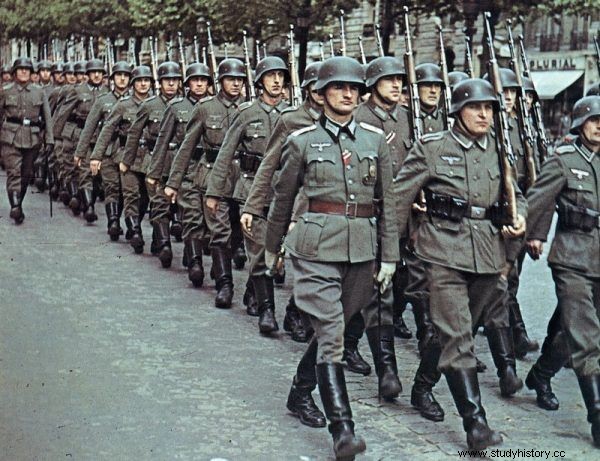
About 400 men were enlisted in the Wehrmacht from the village of Bojszowy near Oświęcim. Their children had to deal with the stigma of a "German bastard" until the end of their lives (author:Erichvoned, source:Bundesarchiv, license:CC BY-SA 4.0).
Only as adults did they dare to look for their roots and honor the memory of their fallen fathers. They created a kind of memorial park in a nearby forest - they put their names on one hundred birches, because many remembered only symbolic funerals next to empty coffins from their childhood.
There were a dozen or so "such" people in the class. We were only distinguished by strange names - Helmut, Edeltrauda, Ydla, Erna - recalls Józef Kłyk, the son of a soldier incorporated into the Wehrmacht. The past, war experiences and days spent in German uniforms were talked about quietly at home. Those whose mothers refused to talk about their fathers remained guesswork. And the questions: why everyone calls them Swabian bastards and whores children?
Beate or Beata?
The turmoil of war and the post-occupation chaos helped to hide the true origins of the children. More than once, a man returning after three years found "his" one-year-old child at home. Some of them were therefore not only the infamous burden of their mother, but also the object of hatred both by the villagers and the new "father" . So many were abandoned so that the spouses reunited after the war could lead their old lives.
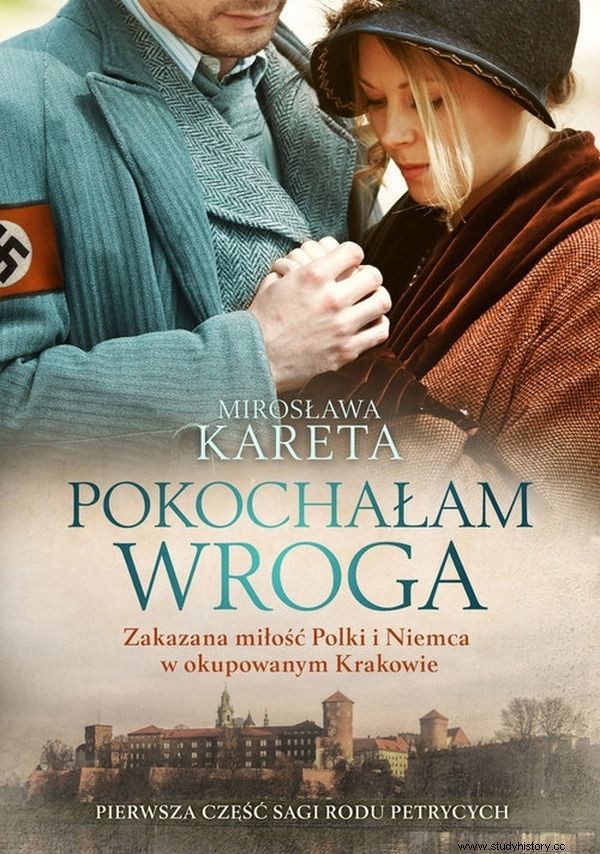
A story unthinkable! The relationship between a Polish patriot and a German soldier, and a family secret, which after many years is discovered by a respected Krakow doctor - all this in the latest novel by Miroslaw Kareta "I fell in love with my enemy". The book is available at Znak.com.pl.
This was the fate of Michalina Wąs, who at the age of five (in 1947) ended up in an orphanage. Her mother's husband was incapable of accepting the former German brat in his home .
Nobody is able to estimate how many women have perpetrated infanticide out of fear and shame of the truth. One can only guess how many of the children born during the war and convinced that their fathers died in the fight against the occupier are in fact the fruit of fleeting Polish-German romances or rapes.
Disgrace
One thing was for sure - you should neither speak nor ask about your origins. The father in the Wehrmacht uniform was basically a sentence for the child and the mother . Social ostracism excluded them from life. In the first months after the war, strict regulations were in force in Poland, both for native Germans, Volksdeutsches, and for those who could be proved of German origin - food rationing for hunger allowances, white bands distinguishing them from the crowd and general prohibitions on entering public places .
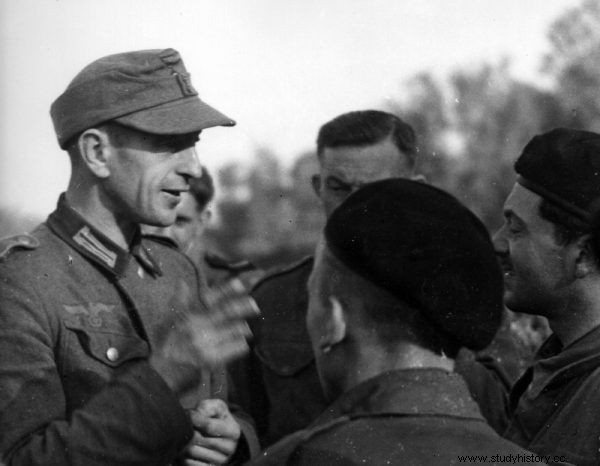
Contrary to popular opinion, entries on the Volkslist were not entirely voluntary. Pictured:A Pole who was forcibly conscripted into the Wehrmacht talks in 1944 in Normandy with soldiers of General Maczek's 1st Armored Division (source:public domain).
We know the joke then circulated: Who will we slaughter first after the war? Volksdeutsche or Reichsdeutsche? - Reichsdeutsche, because first duty, then pleasure.
Contrary to popular opinion, entries on the so-called volkslists were not completely voluntary. It is especially clearly visible in the case of Silesians and Kashubians. Since they were considered by the Nazis to be "ethnic Germans" who had been "temporarily polonized", entries on the lists took place somewhat automatically. It is estimated that by 1944 about ninety percent of Silesia's population received the status of Volksdeutsch .
They were entitled to category III - temporary German citizenship for ten years, during which the person entered was supposed to prove his fidelity to the Third Reich. After the war, they were considered traitors to the nation, although out of the population of around 1.5 million, less than eight thousand Silesians belonged to the NSDAP . It is estimated that even two hundred and fifty thousand Silesian men were incorporated into the Wehrmacht. Their children were considered German bastards after the war.
Fifth column
The fear of disclosure was justified - we know what happened to the women sleeping with the Germans . Their children were commonly believed to be the "fifth column", the nucleus of Hitler's new army, a disgusting remnant of the occupant. There are known cases of numerous lynchings of women and their offspring, as well as mass murders of Germans remaining in the country. It is enough to mention Nieszawa, where smashed with clubs and drowned fifteen people in the river !
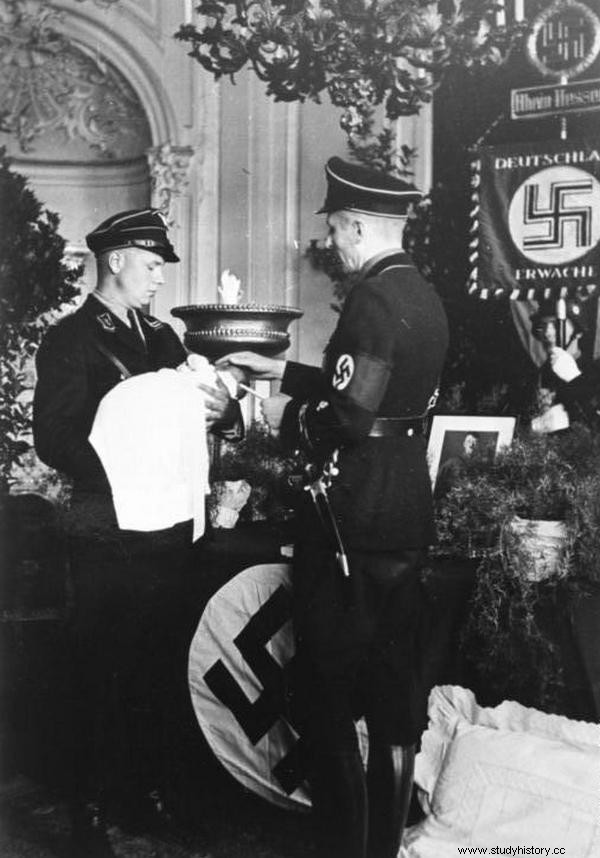
After the war, German children were treated in Poland as the "fifth column", a disgusting legacy after the occupation. In the photo:the baptism of a child from Lebensborn in front of a painting by Adolf Hitler (source:Bundesarchiv, license:CC BY-SA 3.0 de).
On February 28, 1945, the National National Council issued a decree on the Volksdeutsche "On excluding hostile elements from Polish society." Internment camps for Germans were set up , running in Nazi concentration camps. There were also Silesians in them. And since the military had largely been deported, the inmates were mostly elderly, women and children . Mass displacements also began. Mixed couples went to Germany to start a new life on the ruins of the Third Reich.
There is also an account of anonymous witnesses from Skoczów, according to which Polish policemen and Soviet soldiers "chased" the German bastards barefoot between Cieszyn and Bielsko. As a result of this "punishment", many children died of starvation and exhaustion.
There was social consent to the abuse of "whores children", both in local communities and in orphanages. The centers for war orphans, overcrowded to their limits, suffered from poverty and hunger just as much as the entire country plunged into ruin. But German or "Germanized" orphans could additionally count on "special treatment". Violence, hunger, and even cases of sexual abuse have survived in many accounts. Punishing children for using the German language was the order of the day .
Children born of war
The topic of "post-German" children began to appear in Polish literature only after 1989. It seemed that the post-war wounds would never heal, and the fear of repercussions, although muted, was still present in Polish homes.
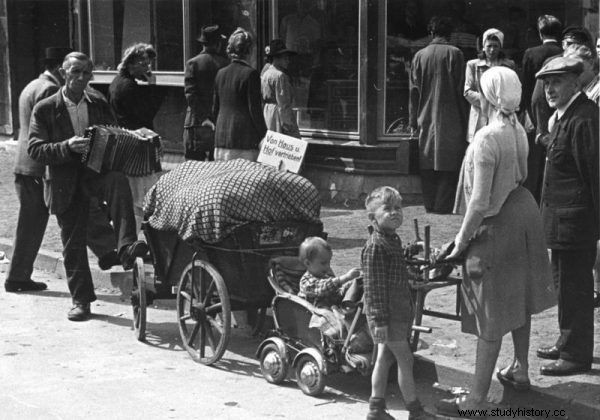
After the war, many mixed couples fled to Germany with their children. The children who stayed in Poland faced a hard fate. Pictured:Germans expelled in 1948 (source:Bundesarchiv, license:CC BY-SA 3.0 de).
Poland has never had any reliable research into the real number of "German bastards". The years of communist rule contributed to distortions and hiding the truth . In many cases, the children of German soldiers found out about their origins in passing - from random people or, after their mothers died, from documents or photos of men in German uniforms hidden for years.
To this day, many people have not discovered the names of their fathers. It was for them that the term "children born of war" was coined. Children born of war who have been stripped of their identity by the war.
***
Love of a Polish woman and a German during World War II? For many, this is a taboo subject.
In "I fell in love with my enemy" by Mirosław Karet he skillfully takes us into the reality of Krakow under Nazi occupation. We meet Jadwiga, a maid from a good home, facing quite a dilemma - be guided by heart or patriotism? In the meantime, we get to know the contemporary history of a Krakow doctor who discovers a great family secret ...
